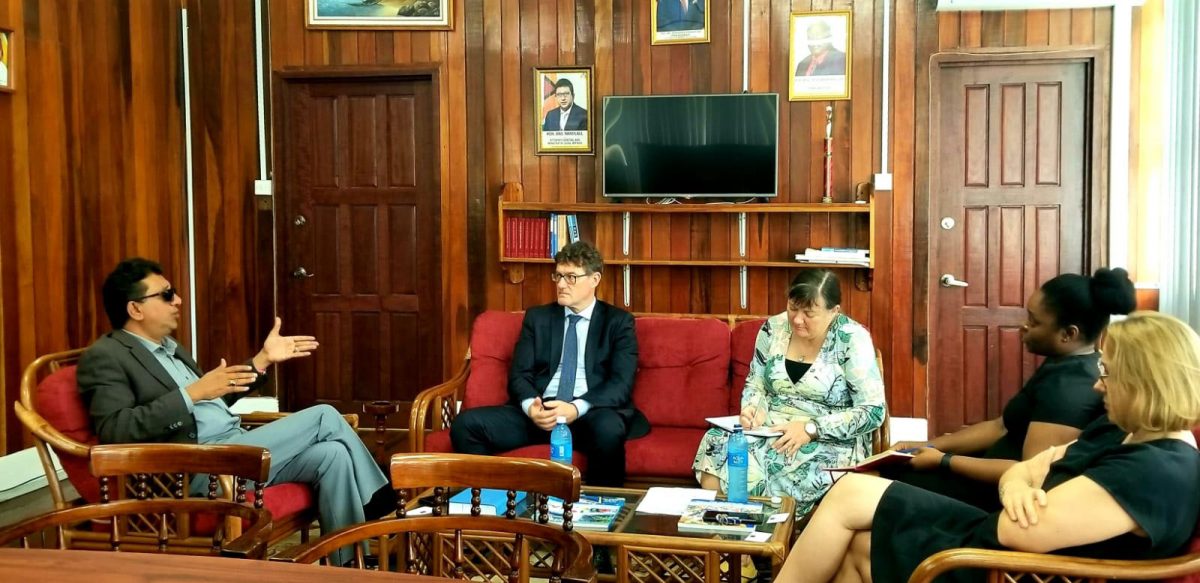A team from the European Union (EU) yesterday met with Attorney General Anil Nandlall SC on electoral reforms and reiterated an offer of assistance to the process.
A statement from the AG’s Chambers said that the delegation from the EU Follow-up Mission comprised Alexander Matus, Team Leader – Electoral Expert; Anne Marlborough – Legal Expert and Evelina Melbarzde, Deputy Head of Delegation of the EU in Guyana. Accompanying the Attorney General in the meeting was Joann Bond, Deputy Chief Parliamentary Counsel.
During the meeting, the statement said that the delegation inquired about the progress of Guyana’s efforts at electoral reform and the implementation of the recommendations of the EU Election Observation Mission which participated in the March 2, 2020 General and Regional Elections. The statement said that the EU team also offered assistance to aid the process of strengthening Guyana’s electoral mechanisms.
The statement said that Nandlall informed the delegation of a number of measures since undertaken at electoral reform, including amendments to the National Registration (Amendment) Act 2022 and the Representation of the People Act 2022, which were enacted to correct the deficiencies and fill gaps.
“We reviewed what transpired and saw where parts of the legislation were abused, and discretion was exercised in the most arbitrary and capricious manner. Gaps in the legislation were exploited in manners inimical to the electoral process, and we also saw the deficiencies of some of the provisions and the ambiguities that were exploited and led to interpretations that were clearly irrational,” the Attorney General said.
He also informed the delegation of the over two dozen criminal charges instituted against persons accused of wrongdoings during the elections and of the Presidential Commission of Inquiry (CoI) into the March 2, 2020 General and Regional Elections whose report was recently published.
The statement said that the delegation also raised certain additional legislative changes as well as policies and administrative measures which can have a positive impact on Guyana’s electoral process and democratic credentials. The statement said that the Attorney General assured the team that the reforms taking place in the electoral arena are a “work in progress” which will continue.
He pledged the Government’s commitment to the continuous strengthening of the electoral machinery and improving the democratic architecture of the country for the public good.
In a follow-up visit in March, 2021, the EU had stressed the need for urgent reforms.
“Now is the time for decisions and actions. For election reform to be effective its implementation needs to begin well before the next elections are called. Inclusive and transparent reform process helps build confidence in elections and their results,” Chief Observer Urmas Paet had told a press conference on March 19 at the Arthur Chung Conference Centre.
The EU Observer Mission (EUOM) had underlined eight priority recommendations. Aside from consolidating electoral legislation, the EUOM had recommended a reform of the constitution in relation to the composition of GECOM. Specifically the recommendation called for a national consultation process to overhaul the composition and functioning of the Elections Commission, notably to ensure a more inclusive representation of the various components of the Guyanese society and political spectrum. Currently, the commission comprises three representatives each from government and the main opposition as well as a chair selected by the president from a list submitted by the opposition leader.
Further since a lack of accountability and oversight in political party and campaign finance contributes to an uneven playing field, the Electoral Observation Mission had recommended that Guyana develop, in a consultative process, effective legislation to regulate political finance, taking the principles of equality, transparency and accountability into account. Such legislation could provide transparency in campaign incomes and establish reasonable limits for campaign expenditure as well as disclosure and reporting requirements and effective sanctions.
The list system was also one of the subjects in the EU observers’ report. It said that electors are unaware of whom they are voting for. They pointed out that in Guyana’s closed list system and parties have full discretion to select – after the poll – any candidates from the list to fill their number of seats won.
“This is inconsistent with constitutional provisions nthat the manner of preparing lists shall allow voters to know which candidate they are electing”, it had said.
It noted that under the existing closed list system, parties are required to present and are bound by ranked lists to allow voters to know which candidates they are electing, as required by the Constitution.






